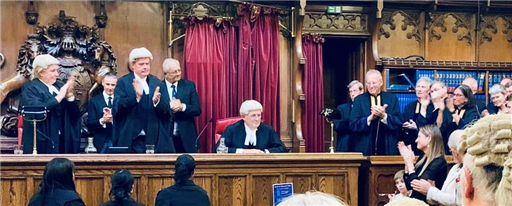
The Impact of LASPO on Access to Justice – A View from Law for Life
Published: 27/03/2023 09:40

This year will see the 10th anniversary of the implementation of the Legal Aid, Sentencing and Punishment of Offenders Act 2012 (LASPO).
In 2017, the Law Society reviewed the impact of the changes introduced in 2013 and found:
- legal aid is no longer available for many who need it;
- those eligible for legal aid find it hard to access;
- wide gaps in provision are not being addressed;
- LASPO has had a negative impact on the state and society.1
The reduction in funding for civil legal aid has resulted in ‘legal aid deserts’ where providers have left the legal aid market, leaving ever increasing numbers of people in need with fewer options to get legal aid.2
Within the family law sphere, the aim of the changes introduced by LASPO were to discourage people from making private family law applications at all, and instead encourage them to ‘take responsibility for resolving such issues themselves’3 with mediation promoted as the primary alternative. However, publicly funded MIAM figures have fallen by 60% since LASPO was implemented, while case starts have continued to rise to an all-time high of 54,920 in 2019.4 In its recent report, on access to justice within the private family court, JUSTICE observes that:
‘The policy therefore appears to have achieved the opposite of its intention: it reduced legally-aided mediation and increased court use.’5
As a consequence, the decade since LASPO has seen the numbers of litigants in person (LiPs) rise in courts and tribunals across England and Wales.6 In terms of efficiency and the delivery of justice, this of course has had wide ranging implications.7 It is easy to overlook, when considering the data (or lack of),8 that in every case that involves a LiP there is at least one person’s life that has been significantly impacted by legal problems. That person then has to navigate a court system which is designed for experts, with no or very little help.
JUSTICE has identified that there are numerous ‘unknowns’ for LiPs:
‘the law, and how to legally translate the case in court documentation; what to expect in the building and the courtroom; how to prepare for a hearing; the conduct of the hearing itself and the roles of different actors within proceedings ...’9
Here at Law for Life,10 we hear from LiPs regularly via our website Advicenow about the ‘unknowns’ they have to cope with. Our users’ feedback often makes for harrowing reading. The legacy of the COVID-19 pandemic and the cost of living crisis are only serving to exacerbate the difficulties our users face day in, day out.
For those who are cognitively and digitally capable we have a range of online legal information resources to support LiPs. Our community training courses aim to reach those who cannot manage to use our online help unsupported.
Based on Legal Capability research carried out with the University of Bristol,11 all our resources aim to help the reader to:
- recognise the legal dimensions of their problem;
- find out more about the legal dimensions of their situation; and
- deal with the law-related issues they are facing.
Our guides and other resources focus on the early resolution of legal problems, wherever possible. They not only set out what law applies in any given situation, but they also empower the reader to take action to sort out their legal problem – by setting out the steps to be taken, and by encouraging the reader to develop the skills and attitudes they need to succeed. We try to ensure that all our resources as helpful as possible by testing them with members of the target audience and those who support them prior to publication.
Our materials are accessible to all who need them. We charge for the extended versions of five guides, but we provide them free of charge to those on a low income (they just have to ask). Our guides are reliable and up to date – all of our materials are peer reviewed by practising lawyers before publication and updated regularly.
Our family law resources are extensive and range from short introductory pieces, for example, on where to start if someone has just separated, to detailed step-by-step guides that take the reader through an application for a financial remedy order.
The guides give readers guidance on how to resolve their family law problem with a focus on avoiding court and using mediation and/or solicitors where people can afford to. These include:
- ‘A survival guide to divorce or dissolution of a civil partnership’.12
- ‘A survival guide to sorting out your finances when you get divorced’.13
- ‘A survival guide to pensions on divorce’.14
Where readers are not able to resolve their problems without the input of the court, we have a range of guides that help them to apply for the most common orders. Whilst these guides focus on the steps required to obtain a particular court-based outcome, they continue to remind the reader of the benefits of mediation and negotiation, and aim to manage the reader’s expectations of the court’s remit. These include:
- ‘How to get a divorce or end a civil partnership without a lawyer’.15
- ‘How to apply for a financial order without a lawyer’.16
- ‘How to fill in your financial statement (Form E) – film’.17
From feedback, we have identified that people with no previous experience of court often have many misconceptions about court processes and the role of professionals. In response, we have developed guides on what to expect when the other side is represented and how to prepare for a remote hearing.
In the context of LASPO and endless feedback from our users about their inability to access legal advice, we carried out our own research. When we surveyed our users on why they tend not to get legal advice despite understanding that it would be beneficial, we found that unaffordability is only one issue people face. They also worry about the unpredictability of how much it will cost; how to find a good solicitor, and how to assess whether spending their small amount of funds on a solicitor will be worthwhile. In response to this we developed a project with Resolution to establish a clear pathway for people using our guides to get to Resolution members willing to provide high-quality, low-cost unbundled advice.
This project has now evolved to become the Affordable Advice service, where readers can work through the appropriate Advicenow guide and, at the most important points, choose to access fixed-fee low-cost legal advice from an experienced Resolution member solicitor who is part of our Affordable Advice panel of lawyers.18 Most appointments are £120 including VAT.
Evaluation of the impact of this service has been extremely encouraging, with clear evidence that it increases the legal capability of those able to use our guides and also access tailored legal advice:
- 93% said advice helped them feel more confident;
- 93% said it reduced the stress;
- 82% said it helped them decide to do something differently; and
- 89% felt it helped them make their case better.
‘People who have never had to use a solicitor before (like me!) are terrified of the cost and have no idea what is involved. Overall, an amazing service.’ Service user
Despite calls from numerous influential bodies and committees for the return to state-funded early legal advice for those in need,19 it is not clear if or when this will ever happen, or what shape it would take. So, in the meantime we, together with our colleagues in the Access to Justice Sector will continue to support LiPs in the ways we can and help to amplify their voices.
As practising lawyers and judges, please take a moment to consider how our resources might be of help to someone you cross paths with – here are a couple of suggestions:
- recommend Advicenow to any LiP you meet – be that a prospective client who cannot afford your rates, a person on the other side to your case, or someone in your court room;
- tell colleagues who work with or speak to LiPs – clerks, receptionists, court staff – about Advicenow.
And if you have time, do get in touch – we are always in need of an expert!









